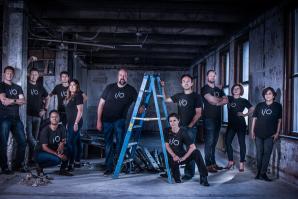In growing a business, practice is critical to peak performance — there’s no substitute. A founder needs to know how to pitch the business to investors and customers. Most entrepreneurs enter markets with business plans, and many need guidance in terms of both crafting their business plan and solidifying their elevator pitch. That takes practice.
The Kauffman Foundation’s 1 Million Cups, a free national network with 180 chapters, helps entrepreneurs hone their plans prior to the business’ entry into the market. During their December meetup in Sacramento, one startup presented a business plan for feedback: Opeeka, which aims to provide software solutions for mental health care services. The event was held in conjunction with StartupSac, a nonprofit organization cofounded by Laura Good and Jeff Bennett in 2015 that educates and connects startup founders and innovators.
Good told Comstock’s about her organization’s efforts to accelerate entrepreneurship in our region.
How do you describe the synergy between 1MC and StartupSac?
1MC is like the front porch of Sacramento’s startup community and it connects startups to resources such as StartupSac, which incubates new firms in the Capital Region.
What led you to your advocacy work with startups?
I left California in the early 1990s to work in the electronics industry. In 2001, I became involved with my first startup. It was a blast, personally and professionally. In 2008, I worked with an economic development nonprofit, the Sacramento Area Regional Technology Alliance. There, I launched a program to help accelerate medical technology startups and worked with startups in other sectors. When SARTA shuttered in 2015, I was not ready to toss in the towel. I became an independent contractor working directly with startups and entrepreneurial organizations.
How has 1MC and StartupSac facilitated risk-taking among startups?
One of the things I have seen during my time with StartupSac over the past three years is greater commitment from business leaders to focus on tech as an essential part of the Sacramento region’s economic growth strategy. Government employment tends to dominate the regional economy, but tech jobs pay well and provide a future for the talented workforce our region’s colleges and universities are developing. The City of Sacramento has also helped to develop the tech industry, through the Sacramento Urban Technology Lab initiative, which helps startups. These factors have provided more support to startup firms that allows them to take more risks to enter the business world.
What can you share about StartupSac and density, and the importance of building alliances among groups seeking to expand and grow startups?
Startups are arriving in Downtown Sacramento and Old Sacramento, and are getting to know each other. That is a form of density, with revenue-positive startups running into each other at lunch and meeting up in coworking spaces such as I/O Labs in Downtown Sacramento. We have a second Capsity (coworking) location opening up in Oak Park (in 2020), which will help to increase the innovative diversity of local talent in the startup community.
What stands out for you about the pool of untapped talent and the generation of new startups in the Sacramento region?
New graduates from Sacramento State and UC Davis are seeking tech jobs here instead of leaving the area to work. The Greater Sacramento Economic Council and (CBRE) Sacramento published a report on our region’s talented workforce recently. We can keep them in the Sacramento region with more employment in the tech sector.
What has surprised you the most in your time with StartupSac?
It is hard to raise money to support your nonprofit organization while also serving early-stage entrepreneurs. That has been our biggest struggle. We work in the trenches with startups — our constituents — not always coming up for air to communicate with funders such as CEOs.
What are the goals of StartupSac in 2020?
Startups need more than funding, e.g., developing their ideas, meeting mentors, getting business education and finding product market fit, before investors will fund them. We will continue to work with these entrepreneurs to help them sharpen their business plans. Quarterly, we will continue our training program series, StartupSac Warm-up Pitch, for companies that are near-investment ready, meaning they have revenue or are near to that, to sharpen their plans for presentation to investors. Additionally, we look forward to providing more targeted services for startup companies through the renewal of our affiliate agreement with the Small Business Development Center and perhaps an SUTL grant from the City of Sacramento for which we have applied.
Recommended For You

The Next Act
New entrepreneurial workspace I/O Labs is in the limelight, poised to become the flagship California Innovation Hub — but Sacramento has seen this show before
Innovation cannot occur within a vacuum. While it’s nice to have an office door that shuts the world out, successful entrepreneurs understand that the best ideas are molded through collaboration.

Go Fund Yourself
When it comes to fostering and attracting innovative business, does the Capital Region have enough capital?
Does the Capital Region have enough capital? One expert estimates there is about a half billion in funding with only have of that invested. So how are local startups getting funded, and is the pool enough to draw more of them here?



